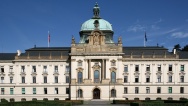Press Advisories
16. 12. 2023 17:03
The European Council decides to open accession negotiations with Ukraine and Moldova
The summit with the Western Balkan countries reaffirmed the perspective for all six countries, i.e. Albania, Bosnia and Herzegovina, Montenegro, North Macedonia, Serbia and Kosovo. The leaders agreed on the need to move forward with the so-called gradual integration of these countries into the EU, i.e. the integration of the Balkan countries into certain areas, while the accession talks continue. In particular, there is a need to cooperate with these countries in the fight against disinformation and cyber threats, especially now in view of Russia’s war aggression against Ukraine, which poses major security challenges. After the summit, the EU countries adopted a declaration to which all Western Balkan countries adhered. In the declaration, the EU welcomes the partners’ determination to respect fundamental European values and principles and to commit to upholding them in accordance with international law.
After that, the European Council decided to open accession talks with Ukraine and Moldova. Presidents and prime ministers of the EU countries also supported granting the status of candidate country to Georgia. Czech Prime Minister Petr Fiala welcomes these conclusions: “These are important decisions. This is an important signal from the EU and it is very good that in these difficult moments for Ukraine and Moldova, the EU is making it clear that it is interested in these countries and that we are interested in their future.”
At the same time, the European Council reiterated its strong condemnation of Russia’s aggression against Ukraine, and states in the adopted conclusions that it is determined to further weaken Russia’s ability to wage offensive war, inter alia by further strengthening its sanctions and through their full and effective implementation and the prevention of their violation, in particular in the case of high-risk goods, in close cooperation with partners and allies. The European Council welcomes the adoption of the 12th sanctions package.
What the European Council could not agree on was the revision of the Multiannual Financial Framework 2021-2027. It has not yet been possible to agree on the approval of an instrument totalling EUR 50 billion to help Ukraine. Hungary was against it and the leaders will continue with the debate at an extraordinary meeting, possibly as early as the end of January 2024: “The Czech Republic is one of the countries that support only a very limited revision. Financial support for Ukraine is also a key part of the budget revision. Last night we reached a proposal that 26 EU Member States, including the Czech Republic, could support, but, unfortunately, the Hungarian Prime Minister did not,” Fiala said.
On Friday 15 December 2023, the European Council discussed the situation in the Middle East as well as defence and security: “I am pleased that the European Council has agreed on an unequivocal condemnation of Hamas’ terrorist attacks and an affirmation of Israel’s right to self-defence in accordance with international law. We insist on the immediate unconditional release of all hostages held in Gaza for over two months,” said Prime Minister Fiala.
On Friday, the EU leaders also adopted conclusions on strengthening European security and defence. They agreed to deepen the Member States’ cooperation in the purchase of defence equipment. The European Council also condemned the use of migrants as a tool of hybrid warfare, as is happening on the border with Poland and more recently on the borders of Russia and Finland. The European Council also condemned all forms of hatred and intolerance, with an emphasis on the fight against anti-Semitism.






